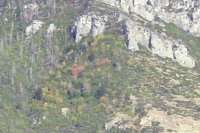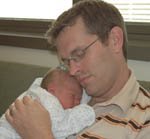I work with some delightful and entertaining people, and although some of us can hear the clatter of each other's keyboards, we still use instant messaging (via Apple's iChat) to brainstorm, discuss issues, or simply distract each other from work.
Like our meetings, our productive iChat discussions are frequently interrupted by tangents—or, rather, our iChat tangents are occassionally interrupted by productive discussions. The other day we had a particularly entertaining chat, portions of which I will share here, edited only slightly.
The chat included four individuals, whose real names I will not share. I will, instead, identify each by his or her iChat icon, which appear by every comment an individual makes in a chat:

1. Abominable snowman (
the abominable snowman, from that claymation Christmas movie of years gone by)

2. Rubin (actor Crispin Glover in Rubin and Ed)

4. Fedora (a cool brown hat that has likely appeared in many, many movies and on the heads of various famous people)

3. Calvin (of Calvin and Hobbes fame)
Background: The ostensible purpose of this chat was to brainstorm a title for a magazine article. Rubin, Calvin, and Fedora were each in their respective offices. After a bit of productive brainstorming by these three, Snowman joined the chat from a conference Snowman was attending in Seattle. As he/she chatted, Snowman was sitting in a session listening to a speaker, with other conference participants around him, presumably similarly attentive.
[Snowman joins the chat]
Fedora: wow, long distance chat now
Snowman: oh man they are talking about AJAX
Calvin: like the cleanser?
Snowman: like asynchronous Java and XML and microapplications
Fedora: ooh
Calvin: aah
Fedora: I'm so sad I'm not there
Snowman: there was a great one on blogging and commercial conversion
Snowman: but I digress
Calvin: "commercial conversion" is a nice title
Fedora: commercial conversion
Calvin: jinx
Fedora: baptizing a whole company?
Snowman: that's what I thought, but I was so wrong
Snowman: it's getting people to actually check out and buy the stuff in their inbox
. . .
Snowman: What is the most promising proposition [for a title] thus far?
Fedora: I liked the ones about gold and the ivory tower
Fedora: making gold in the ivory tower
Fedora: the ivory tower turns gold
Fedora: There's gold in that thar tower
Snowman: Spinning Theory into Gold
Fedora: spinning ivory into gold
Snowman: so I had 4 different kinds of chowder for lunch
Snowman: not sure how that is relevant
Calvin: wow, I bet you're full
Snowman: but smoked salmon chowder is surprisingly wonderful
Snowman: maybe it was because I burped
Snowman: (oops)
. . .
Fedora: did you see that NY Times article about the Napoleon Dynamite festival?
Snowman: i dated a girl from Preston
Snowman: I couldn't get the NYT to log me in so I missed it
Snowman: i was not converted
Rubin: do you think they felt insulted that none of the main actors came?
Rubin: by the way, i saw nacho libre—good
Rubin: in spite of my misgivings
Fedora: my favorite line from the NYT article:
Fedora: this napoleon impersonator is at a texas/oklahoma basketball game, performing
Fedora: attractive woman wearing a tiara asked for a signed photograph. "I thought, 'What kind of idiot wears a tiara to a basketball game?' " he recalled.
Snowman: oh gee they are actually showing code on the screen and talking about specific response tables
Snowman: glargh
Fedora: So, channeling Napoleon, Mr. Demke posed the question. "She laughed," he said, then introduced herself as Jennifer Berry, the new Miss America.
Fedora: "I felt so stupid. She thought I was playing in character. I was grateful she was a fan of the movie."
Snowman: that is funny
Fedora: you're not laughing in your conference are you?
Snowman: oh no I wouldn't dare
Fedora: hey, everyone, let's try to make [Snowman] laugh out loud
Calvin: he's making the sound glargh
Snowman: I might spew complimentary brownies
. . .
Calvin: [Attempting to redirect to productive conversation] Ideas for sale at BYU
Fedora: laboratory to real world
Calvin: goodies from the lab table
Rubin: entreprofessors
Fedora: shopping at the lab table
Snowman: From Blab to Lab to Fab
Calvin: lab table buffet
Calvin: entreprofessors is fun
Rubin: i'm liking [Snowman's}
Fedora: take a seat at the lab table and place your order
Calvin: I'd like two IsoTrusses, some sparkling yogurt, and an order of ceragenins
Rubin: also, one side of turkey
Calvin: hold the cholera, please
Fedora: I'm Professor Smith and I'll be your server. Our special of the day is Turkey Vaccine with a side of synthetic diamonds and water modeling to drink
Fedora: holy cow... I just realized my zipper was down...
Fedora: how long has that been?
Fedora: sheesh
Calvin: you didn't really have to tell us all that
Rubin: are you just trying to get [Snowman] to laugh?
Rubin: it worked on me
Calvin: or are you just trying to make [Snowman] laugh outloud
Fedora: hoping for a good guffaw
Rubin: and was that still part of professor smith's monologue
Fedora: no, that was me reclining while I type and suddenly looking down
Calvin: Serving up studies
Fedora: Peddling Ideas
Fedora: The Marketplace of Ideas
Fedora: The Idea Market
Snowman: Ohhh nooooo
Fedora: From the Lab Table to the Kitchen Table
Rubin: something to put stock in
Snowman: I've just been kicked out of the session
Fedora: :)
Snowman: like that guy with the cell phone on
Snowman: Don't Look Down... Never Look Down
. . .
Rubin: i interviewed someone named T today
Rubin: when I asked him "Are you T?" I couldn't help but chuckle softly
Calvin: did he have a goatee?
Calvin: lots of chains?
Calvin: mohawk
Calvin: did he call you sucka?
Rubin: no
Snowman: It's Time for T
Rubin: but i pitied the fool
Calvin: oh, must be another T




 This morning over breakfast, I mentioned to Lizzy that BYU was playing Utah in football this weekend. "We like both teams this week," she observed.
This morning over breakfast, I mentioned to Lizzy that BYU was playing Utah in football this weekend. "We like both teams this week," she observed. Lizzy absolutely loves the Friend, and I quickly told the woman of her publication's popularity around our home. When we stopped by a garage sale earlier this year, a cardboard box filled with Church magazines caught our eye, and Lizzy began gleefully pulling out old copies of the Friend that she had to have. We headed home that day with a dozen or so issues that predated our own subscription. Now those magazines sit in a pile by her bed, and she regularly reads and rereads them. When the new issue comes each month, she gets all excited about "her magazine" and can't wait to devour it. Bedtime stories frequently come from the Friend, and the magazine serves as a handy quiet book for Church meetings.
Lizzy absolutely loves the Friend, and I quickly told the woman of her publication's popularity around our home. When we stopped by a garage sale earlier this year, a cardboard box filled with Church magazines caught our eye, and Lizzy began gleefully pulling out old copies of the Friend that she had to have. We headed home that day with a dozen or so issues that predated our own subscription. Now those magazines sit in a pile by her bed, and she regularly reads and rereads them. When the new issue comes each month, she gets all excited about "her magazine" and can't wait to devour it. Bedtime stories frequently come from the Friend, and the magazine serves as a handy quiet book for Church meetings.  1. Order the side salad for 99 cents. I've tried the Caesar side salad (also 99 cents), but I prefer the other because it has more stuff (tomato, cucumber, carrots). The side salad comes with a few dressing options, which they'll ask you about. I've tried it with the ranch, which was good, but I actually prefer a nontraditional dressing (see step 3). These days I tell the person taking my order that I don't want a dressing.
1. Order the side salad for 99 cents. I've tried the Caesar side salad (also 99 cents), but I prefer the other because it has more stuff (tomato, cucumber, carrots). The side salad comes with a few dressing options, which they'll ask you about. I've tried it with the ranch, which was good, but I actually prefer a nontraditional dressing (see step 3). These days I tell the person taking my order that I don't want a dressing.  3. Order the 5-piece chicken nuggets, also for 99 cents. You have a number of sauce options. I love the honey mustard, which makes a tangy, sweet salad dressing. To get enough for the salad, though, you have to get two containers of the sauce, which they always provide for the asking.
3. Order the 5-piece chicken nuggets, also for 99 cents. You have a number of sauce options. I love the honey mustard, which makes a tangy, sweet salad dressing. To get enough for the salad, though, you have to get two containers of the sauce, which they always provide for the asking.
 It wasn't very long ago that I was blogging about all the snow still clinging to the mountains around here. By my memory, the snow patches lingered until mid- to late July before melting off the fronts (west) of the mountains.
It wasn't very long ago that I was blogging about all the snow still clinging to the mountains around here. By my memory, the snow patches lingered until mid- to late July before melting off the fronts (west) of the mountains. A week or so ago I noticed a tinge of color at the top of the mountain east of my office, but I refused to publicly acknowledge its existence. But now it's undeniable... and moving down the slope (see evidence at right). Even halfway down the mountain there is some good red. Crazy.
A week or so ago I noticed a tinge of color at the top of the mountain east of my office, but I refused to publicly acknowledge its existence. But now it's undeniable... and moving down the slope (see evidence at right). Even halfway down the mountain there is some good red. Crazy. Fall always seems to come too early. I usually notice it the last week of August. I remember first being stunned by the early fall emergence when I was in marching band. Band camp was the last week of August, and we would spend almost all day every day marching around on the hot blacktop (we practiced in a big parking lot on campus), sweating profusely. Hats and sunscreen were a must, and water breaks (and fights) were frequent. We called it "Sweat Week." (They're out there today, by the way; I heard them rehearsing this morning.)
Fall always seems to come too early. I usually notice it the last week of August. I remember first being stunned by the early fall emergence when I was in marching band. Band camp was the last week of August, and we would spend almost all day every day marching around on the hot blacktop (we practiced in a big parking lot on campus), sweating profusely. Hats and sunscreen were a must, and water breaks (and fights) were frequent. We called it "Sweat Week." (They're out there today, by the way; I heard them rehearsing this morning.) While we were in California, Christine and I logged on and played Web boggle with Jen and Chad (Christine's twin and husband). We played as a team (Team Lizzy), with Christine and I on one laptop and Jen and Chad on another (all sitting on the couch together—gotta love wireless).
While we were in California, Christine and I logged on and played Web boggle with Jen and Chad (Christine's twin and husband). We played as a team (Team Lizzy), with Christine and I on one laptop and Jen and Chad on another (all sitting on the couch together—gotta love wireless). Blue swells rising,
Blue swells rising, Tonight, after Lizzy had fallen apart twice—once when her abbreviated pre-birthday party with cousins came to an end and once when the "pajama party," designed to ease the end-of-party-sadness, didn't turn out like she hoped and also came to an end—I realized that it is all my fault. When I was younger, I was just like Lizzy.
Tonight, after Lizzy had fallen apart twice—once when her abbreviated pre-birthday party with cousins came to an end and once when the "pajama party," designed to ease the end-of-party-sadness, didn't turn out like she hoped and also came to an end—I realized that it is all my fault. When I was younger, I was just like Lizzy. Cute Baby (who used to be Calvin)
Cute Baby (who used to be Calvin) Abominable snowman
Abominable snowman Fedora
Fedora 1. Abominable snowman (the abominable snowman, from that claymation Christmas movie of years gone by)
1. Abominable snowman (the abominable snowman, from that claymation Christmas movie of years gone by) 2. Rubin (actor Crispin Glover in Rubin and Ed)
2. Rubin (actor Crispin Glover in Rubin and Ed) 4. Fedora (a cool brown hat that has likely appeared in many, many movies and on the heads of various famous people)
4. Fedora (a cool brown hat that has likely appeared in many, many movies and on the heads of various famous people) 3. Calvin (of Calvin and Hobbes fame)
3. Calvin (of Calvin and Hobbes fame) A co-worker asked the other day how I made my circle patio. As we chatted about it, I mentioned that we recently found a concrete bench at Wal-Mart, and as of Christine's birthday, the bench adorns our back circle patio.[^^]
A co-worker asked the other day how I made my circle patio. As we chatted about it, I mentioned that we recently found a concrete bench at Wal-Mart, and as of Christine's birthday, the bench adorns our back circle patio.[^^] So I like the idea of sailing. Sailing itself I'm not so sure about these days. But I like to dream about sailing, and I like to read books and watch movies that involve vessels that run before the wind. And my head always turns to look at a sailboat in someone's yard, and I like to tell people that I once owned a sailboat, and I think someday I might want to have a very stable, small dinghy into which I can step a mast[<<] and do a little light sailing on a calm, small lake with my wife and my daughters and we could sing songs and tell jokes and have a picnic while the wind blows us merrily along.
So I like the idea of sailing. Sailing itself I'm not so sure about these days. But I like to dream about sailing, and I like to read books and watch movies that involve vessels that run before the wind. And my head always turns to look at a sailboat in someone's yard, and I like to tell people that I once owned a sailboat, and I think someday I might want to have a very stable, small dinghy into which I can step a mast[<<] and do a little light sailing on a calm, small lake with my wife and my daughters and we could sing songs and tell jokes and have a picnic while the wind blows us merrily along. By the halfway point of our hike (about a mile and a half), the group (10 boys, four adults) had become stretched out along the trail, and our radio crackled as the lead group called back for guidance. “Are we going to turn back?” a teenage voice queried hopefully.
By the halfway point of our hike (about a mile and a half), the group (10 boys, four adults) had become stretched out along the trail, and our radio crackled as the lead group called back for guidance. “Are we going to turn back?” a teenage voice queried hopefully.
 For several minutes we admired the falls. We took pictures, we shared statements of incredulity, we stood again in the center of the canyon to test the strength of the wind and feel the force of the spray, awed at the power and majesty of God displayed through His creations.
For several minutes we admired the falls. We took pictures, we shared statements of incredulity, we stood again in the center of the canyon to test the strength of the wind and feel the force of the spray, awed at the power and majesty of God displayed through His creations. While Christine was away at a retreat for young mothers this weekend, a new circle patio grew in our yard. Last year a larger one appeared in our back yard, and this spring I realized that I had enough bricks left over to make a smaller sibling in the front/side yard. Now we need to find a couple of benches to put with the patios . . . where do you get inexpensive concrete benches?
While Christine was away at a retreat for young mothers this weekend, a new circle patio grew in our yard. Last year a larger one appeared in our back yard, and this spring I realized that I had enough bricks left over to make a smaller sibling in the front/side yard. Now we need to find a couple of benches to put with the patios . . . where do you get inexpensive concrete benches?
 Friday: My younger brother became a dad at last (see photo).
Friday: My younger brother became a dad at last (see photo). Sunday: We planned our young men campout to the Escalante area: I'm very excited. Slot canyons, water falls, mountain lakes, petrified forests . . . it will be awesome.
Sunday: We planned our young men campout to the Escalante area: I'm very excited. Slot canyons, water falls, mountain lakes, petrified forests . . . it will be awesome. Anyhow, day one: The recently acquired glowworm toy that has a remarkable ability to make Caroline happy when she's sad (and which has, as a result, gone through many sets of batteries in its short life).
Anyhow, day one: The recently acquired glowworm toy that has a remarkable ability to make Caroline happy when she's sad (and which has, as a result, gone through many sets of batteries in its short life).